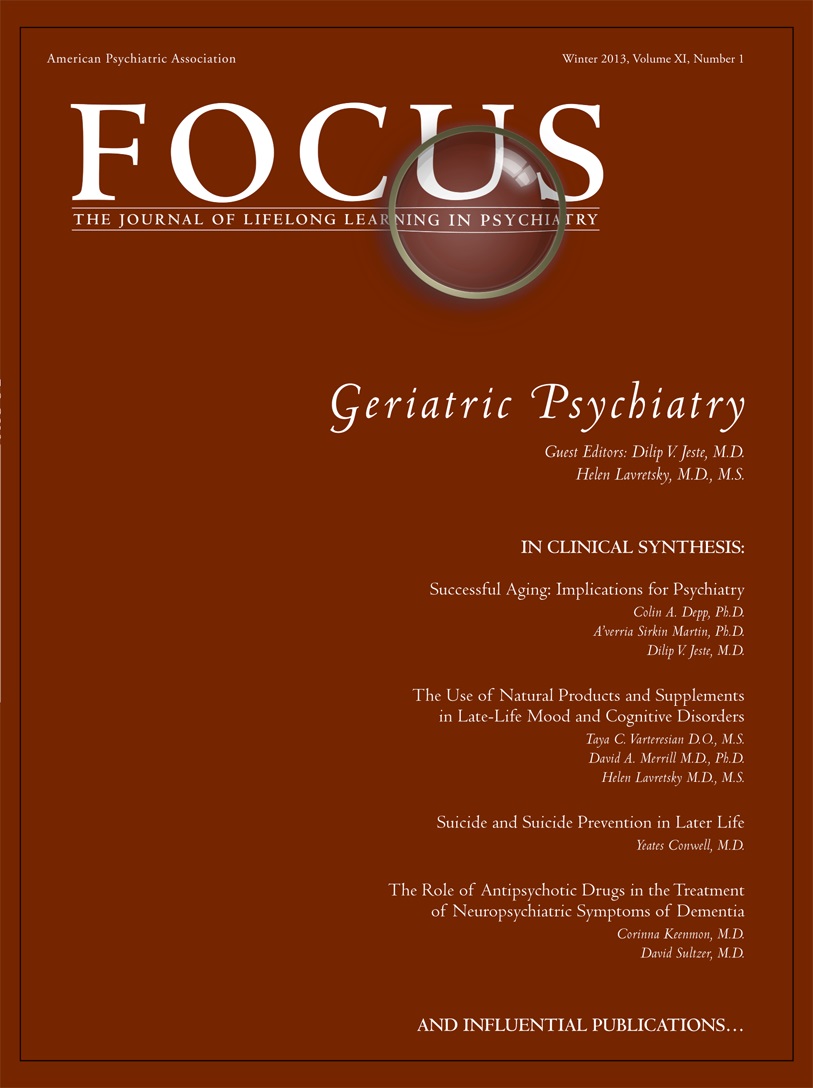The current issue of FOCUS is dedicated to the field of Geriatric Psychiatry. Geriatric mental health research topics covered in this issue encompass the latest clinically relevant studies on successful aging (
1) and the use of natural products and supplements for prevention of geriatric mood and cognitive disorders (
2), as well as articles on novel preventive strategies for late-life depression (
3) and suicide (
4), and the topics of end-of-life care including dementia (
5) and palliative care (
6). The breadth of the topics is reflective of the breadth and depth of the field of geriatric mental health, which is charged with developing strategies for maintaining optimal mental and physical health and functioning in older adults.
Healthcare efforts have been long focused on increasing longevity that resulted in the increase in the average life expectancy in the United States by 20 years over the last seven decades. To respond to this challenge, geriatric psychiatry research is no longer restricted to the studies of late-life diseases but is developing an understanding of successful aging and preventive strategies to ensure lasting independence, resilience, and optimal quality of life for the rapidly growing U.S. and global population of older adults.
At the same time, the needs of older adults with late-life depression and suicidal behavior, and those with cognitive disorders with neuropsychiatric symptoms and their families, remain the main focus of attention for geriatric psychiatrists and allied mental health practitioners. Depression is a leading cause of disease burden, disability, and distress for millions of older adults. In 2010, almost 6,000 adults over age 65 died by suicide in the United States, and perhaps 200,000 worldwide. Because older adults are the most rapidly growing segment of the population, the rates of depression and suicide in this age group are expected to rise dramatically in coming decades. Development of effective preventive approaches to late-life depression and suicide is a major public health priority.
In addition, the burden of chronic medical illnesses has increased dramatically, with over 90% of the U.S. older adults living with one or more chronic and life-threatening diseases. Families often have to cope with the daunting task and stress of caregiving for many years, which has a detrimental effect on caregiver health. Dementia is a common terminal illness plagued with neuropsychiatric symptoms that contributes to the high healthcare costs associated with Alzheimer’s disease and related dementing illnesses. Patients, families, and the society at-large often struggle to cope with the burden of increasing dependence while trying to maintain meaningful personal experiences. Geriatric psychiatrists are often involved with caring for patients with terminal dementia or medical illnesses and their families. End-of-life care ethical and practical issues are becoming increasingly important for clinicians and researchers. A patient- and family-centered approach helps optimize health by addressing the whole person’s balance of body, mind, and spirit.
We are grateful to all contributors to this issue, all of whom are prominent scholars and researchers in the field of geriatric mental health, for their thoughtful and forward looking contributions. We hope the readers will enjoy the state-of-art summary of the field provided in the current issue.

